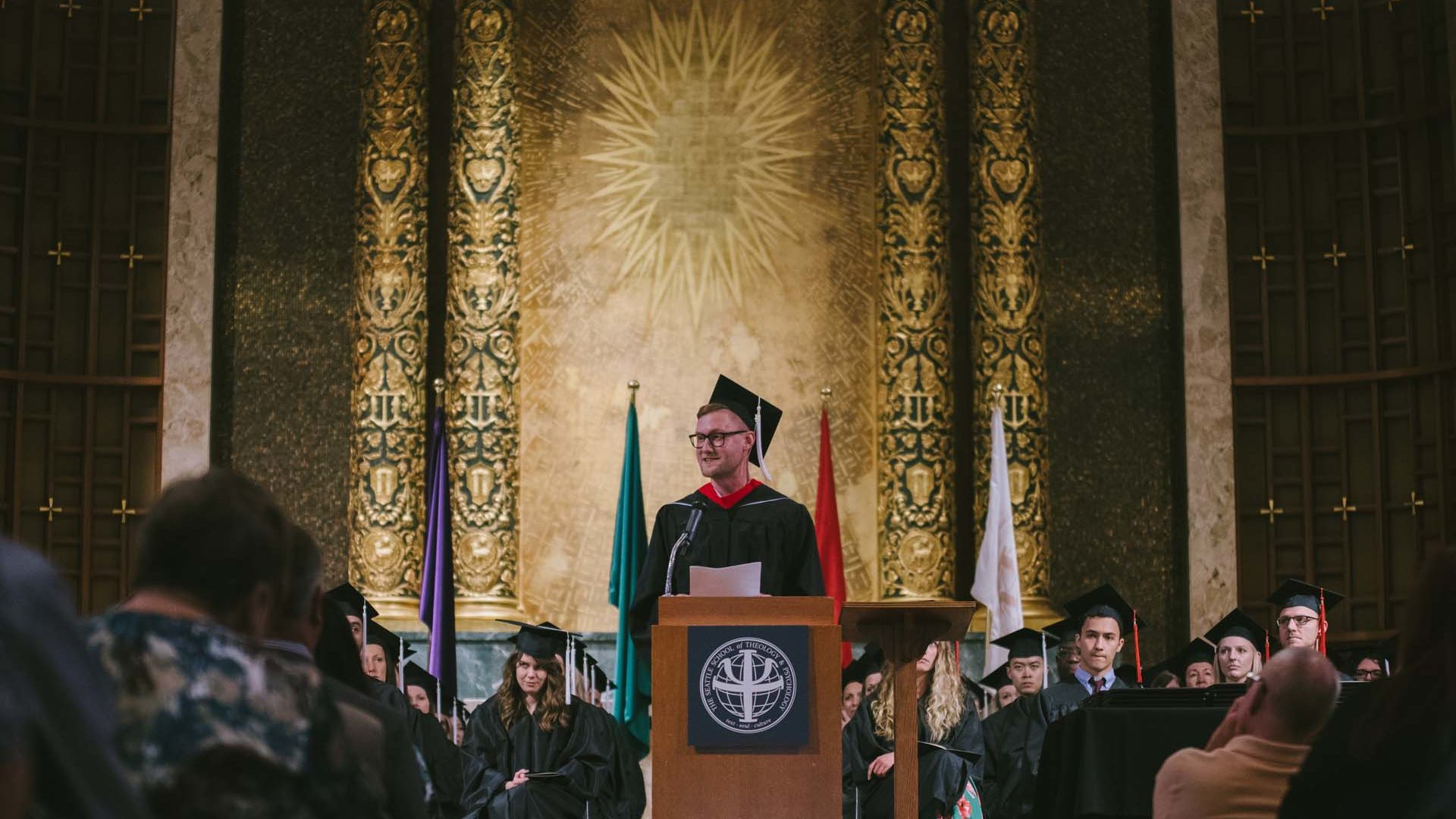Every year at Commencement, the graduating class and faculty select three students—one from each degree program—to offer words of blessing and calling. Here, we’re sharing the full video and text of the speech by Matthias Roberts, MA in Counseling Psychology, about the work of reconciliation and the death and resurrection of whole-hearted, embodied, glorious healing. You can also view the speeches from Alex Mrakovich, (Master of Divinity), and Heather Casimere (MA in Theology & Culture).
On February 12, 2017 one of the greatest prophets of our generation sat on stage at the 59th annual Grammy Awards, her pregnant belly flanked by shimmering gold folds of fabric. She sat, a halo over her head which evoked another mother, the Madonna, Mary, the mother of Jesus. As ambient music swelled and Beyoncé surveyed the audience in front of her, her soft voice quietly broke through the music and she spoke words originally written by Somali poet Warsan Shire: “Baptize me, now that reconciliation is possible. If we’re going to heal, then let it be glorious.”
They were words spoken to her husband, over her marriage, to the people in the crowd, and to the people of our nation. Words that I immediately wrote on my mirror, words that I see daily.
Baptize me, now that reconciliation is possible. If we’re going to heal, then let it be glorious.
Death. And resurrection.
These are words that make me think of the last two, three, four, for some of us five years in this place we call The Seattle School. The deaths that we have gone through. We have each confronted evil present in each of our stories, because death and evil are ever present, and here we are. At a sort of baptism—a commencement, a commissioning. The people you all see sitting behind me know in their very bones, in the depths of their fleshy, beautiful, wise, God-given bodies, that in order for reconciliation to be possible, evil must first be confronted. If there’s a motto of The Seattle School, it might very well be “you can only go as far with others as you have gone yourself.” And we have gone there. We have fought, we have wrestled in the darkness of the night, not knowing if we were in the presence of angels or demons. And, in this moment, we are coming up for air to celebrate. To lean on the faithfulness of God who promises that she carries good work to completion—our work is not complete.
“In order for reconciliation to be possible, evil must first be confronted.”
Dan Allender often says we are called to be a people of glory. And we are people of glory. We have become those who will walk out of this building into what transgender latinx theologian Dr. Robyn Henderson-Espinoza calls the tyranny of the now and, in our own ways, we will stare the waves of white nationalism, homophobia, Christian supremacy, and politically twisted Scriptures in the face and say, to quote drag queen Bianca DelRio, “Not today, Satan. Not today.” Our bodies and stories will be used for healing.
As we simultaneously celebrate and walk into a world that feels like it’s falling apart at the seams, a world where evil currently appears to have the upper hand, this is my call to us—the word of the Lord, as quoted by the prophet Isaiah: do not be afraid. We have done our work, and yet our work is only beginning. Do not be afraid. We have begun to look injustice in the face, but we cannot stop now. Do not be afraid. We have been given great gifts and tools in this place, tools that have power to bring healing, tools to facilitate the inbreaking of the Kingdom of God. And now we must use them. Do not be afraid.
Several thousand years ago, a dark-skinned sexual and gender minority, one whose name we do not know, but who we call the Ethiopian Eunuch, stood at the edge of some water and asked the apostle Philip “what is to keep me from being baptized?” What is to prevent me from doing the work of God in this world? And God’s answer was “nothing.” It is with that same energy, I invoke the Spirit of the Lord as I speak these words: “Baptize us, now that reconciliation is possible. If we’re going to heal, then let it be glorious.”
Let it be glorious.


